Literati: “Ink on the Brink”
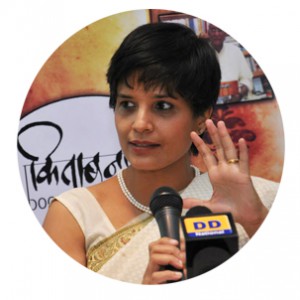 (My monthly column, Literati, in the Hindu Literary Review was published online ( 17 October 2015) and will be in print ( 18 October 2015). Here is the http://www.thehindu.com/books/literary-review/jaya-bhattacharji-rose-on-india-coping-with-book-bans/article7770216.ece. I am also c&p the text below. )
(My monthly column, Literati, in the Hindu Literary Review was published online ( 17 October 2015) and will be in print ( 18 October 2015). Here is the http://www.thehindu.com/books/literary-review/jaya-bhattacharji-rose-on-india-coping-with-book-bans/article7770216.ece. I am also c&p the text below. )
It remains to be seen how India, despite its business potential, copes with cultural policing, muzzling of free speech, and book bans
According to Nielsen’s The India Book Market Report 2015, released at Frankfurt Book Fair on October 14, the print book market in India is worth Rs. 261bn (£2.5bn), making it the sixth largest in the world, and the second largest of the English language markets. U.K. publishers’ revenues, including e-books, home and exports, are worth £3.3bn. India is the second most populous country in the world, with 1.28 billion people. The literacy rate is rising rapidly, from 65 per cent in 2001 to 74 per cent in 2011; it is predicted to reach 90 per cent in 2020. One quarter of young people define themselves as book readers, comprising by themselves a larger group than the population of the U.K. which is 65 million.
It explains why, for some time now, publishers worldwide are keen to explore strategic partnerships with their Indian counterparts in English and regional languages. According to a 2010-12 report Rebalancing the Economy from the House of Commons, Parliament of Great Britain, “40 per cent of U.K. publishing revenues are derived from exports”. Though the statistic is three years old, it will hold validity in 2015 since the links between British publishers and India are amongst the oldest given the colonial past.
But what happens when a market like India with huge business potential mutates into a territory synonymous with cultural policing, muzzling of free speech, book bans and intolerance of ideas? Does it still remain an attractive market to invest in? Increasing number of writers from various Indian languages are returning their Sahitya Akademi awards and Punjabi writer Dalip Kaur Tiwana returned her Padma Shri in protest against the assassination of rationalist scholars like Kalburgi. For some writers, this form of intellectual censorship is linked to the horrific lynching incident in Dadri. Noted Hindi writer, 90-year-old Krishna Sobti, said while returning her award that India did not need any more “Dadri or Babri”.
***
I have contributed an article on the theme of Independence in Indian Children’s Literature for the inaugural issue of
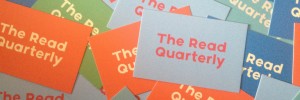 The Read Quarterly. It is a journal on children’s literature, founded by Sarah Odedina and Kate Manning; the Kickstarter campaign has been endorsed by Neil Gaiman. Some of the other contributors include Nury Vittachi, Eoin Colfer, Gita Wolf (Tara Books) and Daniel Hahn. My article maps the literary inheritance of independence/partition of
The Read Quarterly. It is a journal on children’s literature, founded by Sarah Odedina and Kate Manning; the Kickstarter campaign has been endorsed by Neil Gaiman. Some of the other contributors include Nury Vittachi, Eoin Colfer, Gita Wolf (Tara Books) and Daniel Hahn. My article maps the literary inheritance of independence/partition of 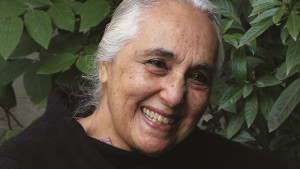 subcontinent. Much of it is inadvertently focused on hagiographies written to suit a specific ideological position, reinforcing communal
subcontinent. Much of it is inadvertently focused on hagiographies written to suit a specific ideological position, reinforcing communal 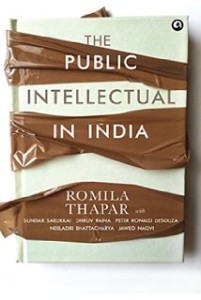 points of view that took root in British India. Fortunately, there are noticeable positive shifts in contemporary fiction, but as Romila Thapar, the eminent historian, wrote to me, “The goal of the national movement was such that communities came together for a cause and set aside what separated them. It is these moments that need to be remembered in the present times.”
points of view that took root in British India. Fortunately, there are noticeable positive shifts in contemporary fiction, but as Romila Thapar, the eminent historian, wrote to me, “The goal of the national movement was such that communities came together for a cause and set aside what separated them. It is these moments that need to be remembered in the present times.”
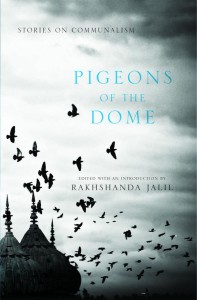 Cultural pluralism, democracy and secularism, the defining traits of India, are now under severe threat. Two collections of short stories published this past month address the complexities of Indian culture and ethos being intimidated by communal forces. Deeply disturbing but essential reading is the Pigeons of the Domes: Stories on Communalism edited by Rakhshanda Jalil (Niyogi Books). It was put together with the sole intention of “tracing the secular thread in the fabric of modern India, a thread that goes back many centuries.” It consists of stories by Gulzar, Ajeet Caur, Asghar Wajahat, Deepak Budki and Keki Daruwalla.
Cultural pluralism, democracy and secularism, the defining traits of India, are now under severe threat. Two collections of short stories published this past month address the complexities of Indian culture and ethos being intimidated by communal forces. Deeply disturbing but essential reading is the Pigeons of the Domes: Stories on Communalism edited by Rakhshanda Jalil (Niyogi Books). It was put together with the sole intention of “tracing the secular thread in the fabric of modern India, a thread that goes back many centuries.” It consists of stories by Gulzar, Ajeet Caur, Asghar Wajahat, Deepak Budki and Keki Daruwalla.
‘They Eat Meat!’ is the opening story in Sahitya Akademi Yuva Puraskar, 2015 winner,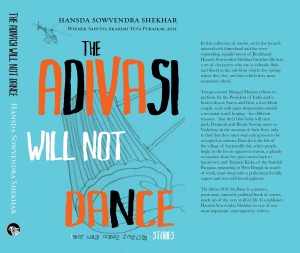 Hansda Sowvendra Shekhar’s new short story collection The Adivasi Will Not Dance. In ‘They Eat Meat!’ Panmuni and Biram Soren go to live in Gujarat, and are surprised to learn that they would have to stop eating non-vegetarian food to be accepted as citizens. According to the author, “The impetus behind the short story was the experience a Santhal family had in Vadodara during 2000-02. …the things I have mentioned are all as they were told to me by this family. I just changed the names. I wasn’t there in Gujarat in 2002 when the riots happened, but I was curious to know what happened, the insider-outsider equation, the pure-impure thing, the veg-non-veg thing, and so I wanted to write this story….This story first appeared in the literary magazine from Kathmandu, La.Lit. Prawin Adhkari and Rabi Thapa, the editors, published it in August 2014 with the title, ‘DON’T MIX WITH THEM, THEY EAT MEAT!’…It read more like an eyewitness report (in the third person) than a fiction based on facts. For the Speaking Tiger version, my editors and I took the report-like feel out and turned it into more story-like. … In the La.Lit version, imagination was minimum; in the Speaking Tiger version, there is more imagination.”
Hansda Sowvendra Shekhar’s new short story collection The Adivasi Will Not Dance. In ‘They Eat Meat!’ Panmuni and Biram Soren go to live in Gujarat, and are surprised to learn that they would have to stop eating non-vegetarian food to be accepted as citizens. According to the author, “The impetus behind the short story was the experience a Santhal family had in Vadodara during 2000-02. …the things I have mentioned are all as they were told to me by this family. I just changed the names. I wasn’t there in Gujarat in 2002 when the riots happened, but I was curious to know what happened, the insider-outsider equation, the pure-impure thing, the veg-non-veg thing, and so I wanted to write this story….This story first appeared in the literary magazine from Kathmandu, La.Lit. Prawin Adhkari and Rabi Thapa, the editors, published it in August 2014 with the title, ‘DON’T MIX WITH THEM, THEY EAT MEAT!’…It read more like an eyewitness report (in the third person) than a fiction based on facts. For the Speaking Tiger version, my editors and I took the report-like feel out and turned it into more story-like. … In the La.Lit version, imagination was minimum; in the Speaking Tiger version, there is more imagination.”
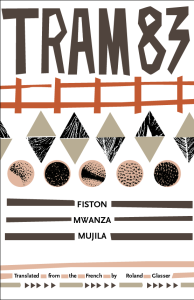 This fine line between fact and fiction is well summed up in the astounding debut novel, Tram 83 by performance artist and poet, Fiston Mwanza Mujila, translated from the French by Roland Glasser, published by Deep Vellum Publishing. Lucien, the protagonist, while reflecting upon his work, asks: “Is there a limit to the imagination of a writer who takes real facts and uses them to construct a world where truth and fiction coexist?” It is not surprising that Indian writers are protesting intellectual censorship by returning state awards.
This fine line between fact and fiction is well summed up in the astounding debut novel, Tram 83 by performance artist and poet, Fiston Mwanza Mujila, translated from the French by Roland Glasser, published by Deep Vellum Publishing. Lucien, the protagonist, while reflecting upon his work, asks: “Is there a limit to the imagination of a writer who takes real facts and uses them to construct a world where truth and fiction coexist?” It is not surprising that Indian writers are protesting intellectual censorship by returning state awards.
17 October 2015
